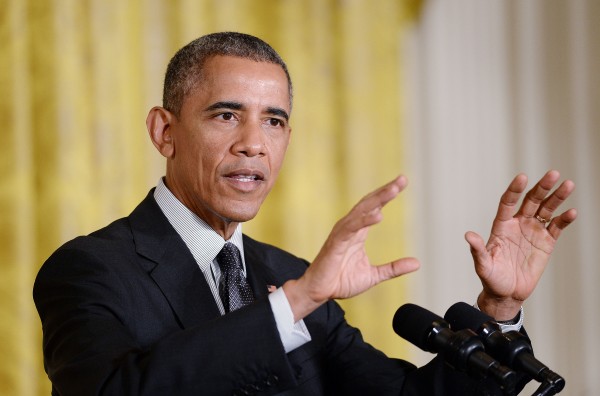Obama’s Crusade to Obfuscate Militant Islam
February 26, 2015
On Feb. 2, President Obama made some peculiar remarks during a speech at the National Prayer Breakfast held in Washington DC, with his esteemed guests, the 14th Dalai Lama and NASCAR Hall of Famer Darrell Waltrip. Yes, that’s right; the spiritual head of Tibetan Buddhism and a racecar driver had breakfast with the President of the United States. But despite bringing these symbolically conciliatory figures together in prayer to satisfy the tastes of college liberals and Southern conservatives, Obama still found room to drive a wedge. The President spoke of the religious violence in the Middle East, Nigeria, India and even the Central African Republic, all unfortunately related to Islam in some way or another. He highlighted the rise of anti-Semitism and hate crimes in Europe. But he also had the following to say about Christianity, “And lest we get on our high horse and think this is unique to some other place, remember that during the Crusades and the Inquisition, people committed terrible deeds in the name of Christ. In our home country, slavery and Jim Crow all too often was justified in the name of Christ.”
In trying to establish some sort of moral equivalency between militant Islam and historical Christianity, Obama cites the Crusades, the Inquisition and the racialized institutions of American slavery and Jim Crow laws (to say nothing of how our modern wars in the Middle East are sometimes derisively called crusades). Obama is vilifying historical Christianity to make the modern political point that religious violence is not unique to Muslims. While this is certainly true, the trope of citing the Crusades as comparable religious violence is misleading. There are historical examples of Christians waging war in the name of God without provocation, such as the violent Christianization of the Saxons and other European peoples outside of the Roman Empire, the obliteration of the Aztec and Incan Empires by the Kingdom of Spain, and the Manifest Destiny of the United States, among others.
The Crusades, however, were not an act of naked aggression against Muslims. Christendom did not strike the first blow in the religious wars of the medieval Levant, something which should nuance our moral judgment. The popular misrepresentation of the Crusades as inexplicable Christian violence is highly misleading, and does nothing to lessen the reality of modern violence committed in the name of Islam against both Muslims and non-Muslims.
The Crusades were a series of medieval military campaigns over the span of two centuries by Christian states in Europe against the Muslim Arabs and Turks in mostly what is now modern-day Syria, Lebanon, Israel and Palestine. They resulted in the foundation of multiple Western principalities in the Levant, a lot of death, the disestablishment of those principalities, more death and a huge cultural, economic and social exchange between Europe and the Middle East. But were these events truly terrible deeds done in the name of Christ, or just rather contemporary? Within the context of Middle Ages, didn’t Muslims initially conquer the targets of the Crusades, Syria, Lebanon, Israel and Palestine (to say nothing of Muslim-ruled Spain, Portugal, Sicily, Iraq, Iran, Egypt, Libya, Tunisia, Algeria, Morocco and Turkey), from their non-Muslim and usually Christian—or in the East, Zoroastrian—inhabitants in the name of the Prophet Muhammad? Holy war seems like pretty consistently medieval monotheist behavior. However, didn’t these conquests of Christian lands continue outside of the Middle Ages under the Ottoman Turks into what is today Greece, Bulgaria, Serbia, Romania, Moldova, Hungary, Macedonia, Kosovo, Montenegro, Albania, Bosnia and Herzegovina, Croatia, Ukraine, Georgia and Armenia, still in the name of Islam? Today, the spirit of jihad has survived in countries such as Iraq and Syria.
Moving on to the more spatially and chronologically immediate examples, Obama cites slavery and the Jim Crow laws as historical crimes committed by Christianity. It is true that Christianity was often used to justify slavery and segregation, but as Catholics might say, this attribution is a sin of omission. After all, Africans were enslaved by their own pagan and Muslim chiefs before being sold to European merchants. But more importantly, what the president fails to mention is the role that Christian-motivated ideals played in ending the international slave trade in the 19th century, or how Christianity was a source of inspiration to abolitionists in the United States, or how Christianity influenced the civil rights activists of the 1950s and 1960s. Wasn’t Dr. Martin Luther King, Jr. a pastor who appealed to Christ’s teachings of fellowship among all people? Instead of selectively vilifying historical Christianity to make modern Islamic fundamentalism look less terrible, shouldn’t the president focus on reality? Thousands of women are currently held as slaves by Muslim terrorists in Nigeria, Syria and Iraq. Islamic fundamentalism is a reality for millions of people right now; the Crusades and the Inquisition are not.












